The Delphic Maxims are a list of Ancient Greek quotations offering advice on how to live a virtuous life. They were engraved on the temple of Apollo in Ancient Delphi, and have been inspiring visitors for over 2,500 years!
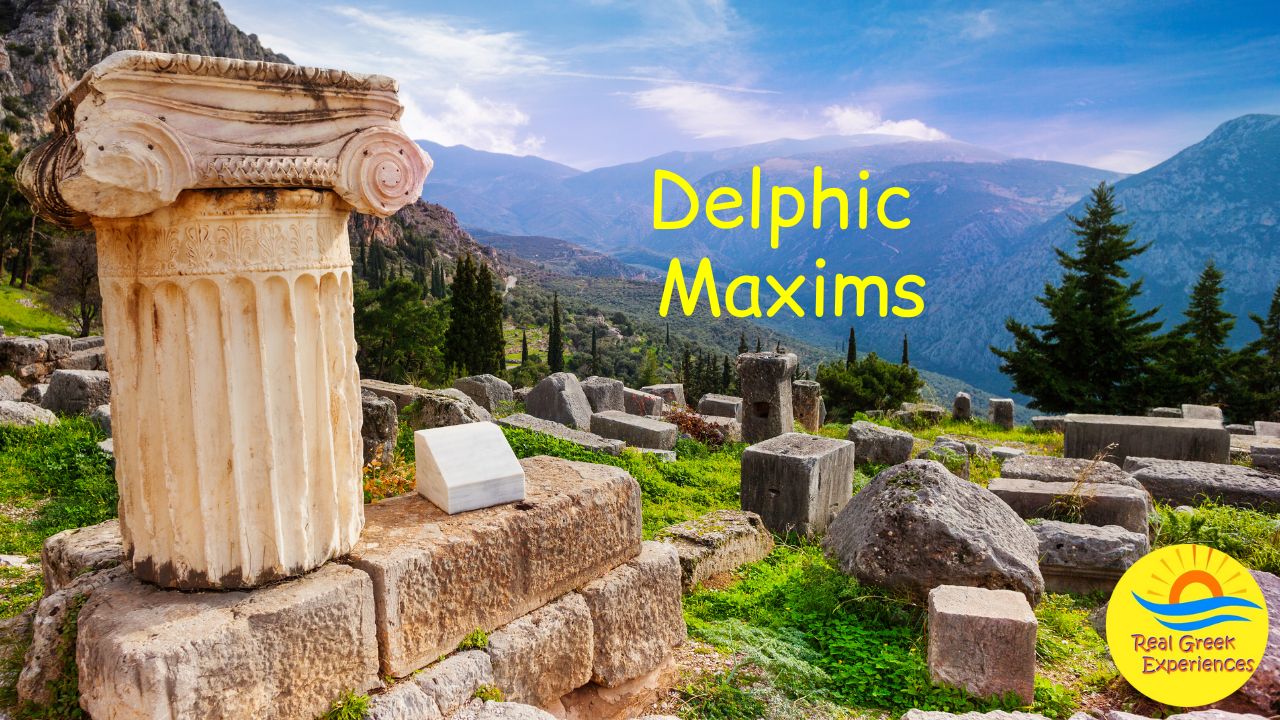
The Delphic Maxims and ancient philosophy
Ancient Delphi is a famous UNESCO site in Greece, which was once a place of worship of the ancient Greek God Apollo, the God of Light, Music, Art and Prophecy. It was also home to the mystic Delphic Oracle, and the high priestess Pythia who was known for her ambiguous prophecies.
You can easily visit Delphi on a day trip from Athens, and it’s totally worth it! It’s one of the most magical sites in Greece.
Ancient Delphi is also the place where the Delphic Maxims were found. The Delphic Maxims are renowned Ancient Greek aphorisms that were once engraved on the sacred temple of Apollo.

These famous quotations are short, consise phrases, offering advice on how to lead a virtuous and happy life. They address themes such as love, friendship, work, debt, reward, wealth, honor and respect. The Delphic Maxims have been resonating with people for thousands of years, conveying timeless messages that are still relevant today.
The origins of the Delphic Maxims
According to legend, the Delphic Maxims, also known as the Delphic orders, had divine origins: The God Apollo himself had passed them on to Pythia. There are, of course, alternative theories.
In his book “Protagoras” (5th century BC), the Greek philosopher Plato states that the Delphic Maxims had been dedicated to the Oracle of Delphi by the Seven Sages of Greece. The authors Diogenes Laertius (3rd century AD) and Joannes Stobaeus (5th century AD), who both studied the lives of Greek philosophers, were in agreement with this view.
The Seven Sages, also known as the Seven Wise Men, were seven Greek men who lived in the 7th–6th century BC. They were renowned for their wisdom, and many of their quotes are still popular today. Here’s a little more info.

Another view is that these ethical teachings were based on popular proverbs, which were preserved through oral tradition and subsequently carved at the temple of Delphi. It is believed that there were hundreds of inscriptions everywhere around the buildings at Delphi – like ancient graffiti!
The Delphic inscriptions
The first temple of Apollo at Delphi was built around the 7th century B.C. It was subsequently destroyed and rebuilt a few times, mainly due to natural disasters. The Delphic Maxims were first inscribed on the stone temple which was built in the late sixth century BC.
The Maxims were engraved at several places on the temple, such as the pronaos, the propylaea, the doorpost, the temple front, the peristyle and the walls of the temple. The inscriptions were likely renewed with every major refurbishment of the temple.
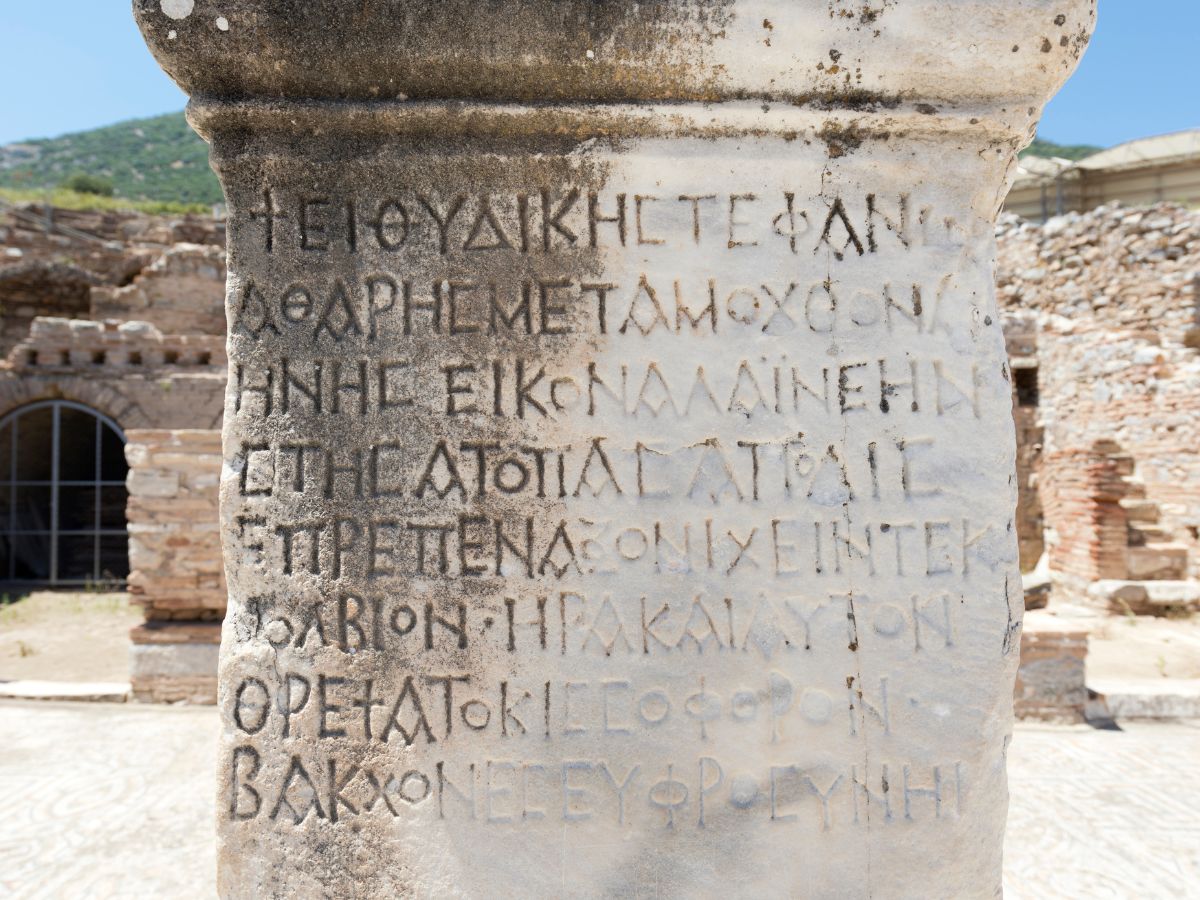
Some of our information about the Maxims comes from Plutarch. He was a Greek philosopher / historian, who also served as priest at the Temple of Apollo during the early 2nd century AD.
Also, Pausanias, the famous Greek traveler / geographer of the 2nd century AD, mentioned that “In the pronaos at Delphi are written Maxims useful for the life of men, inscribed by those whom the Greeks say were sages”.
It’s worth pointing out that similar inscriptions with quotations have been found in many other ancient sites, in Greece and beyond.
The three Delphic Maxims
So now that we know the background of these quotations, let’s have a look at the Maxims themselves!
The three Delphic Maxims which are considered to be the most important, might have been carved on the pediment of the temple. There was also a symbol known as “the Delphic Epsilon”, which Plutarch describes in detail in his book “Morals”.
The 3 Delphic Maxims are:
- Know Thyself
- Nothing In Excess
- A Pledge Brings Trouble
With a bit of (my own very vivid!) imagination, it may have looked something like this – but they could have also been written on the walls:
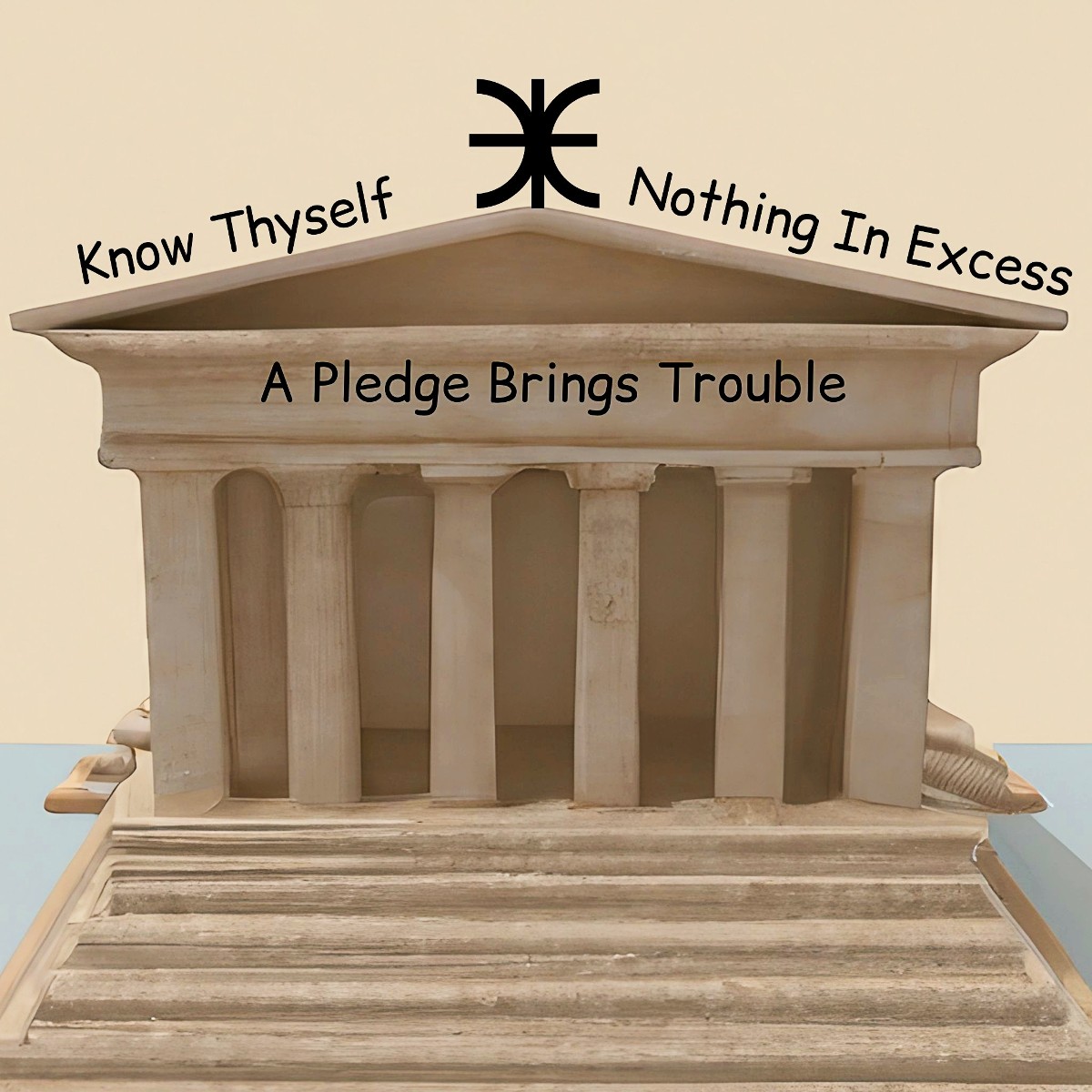
Let’s take a closer look at these three Maxims.
Know Thyself – Γνῶθι σεαυτόν
“Know Thyself” is the best known Delphic Maxim. Self knowledge was central to the Oracle of Delphi. Anyone who had true understanding of themselves, and who knew their place in the world, would live wisely.
This famous quote has been attributed to several ancient Greeks, such as Chilon of Sparta, Pythagoras and Heraclitus. Self-knowledge was particularly important to the Greek philosopher Socrates, whose work is known through his student Plato.
Nothing In Excess – Μηδέν ἄγαν
“Nothing in Excess” is a reminder to stay humble and strive for moderation, rather than excess and greed. The idea behind this Maxim is that moderation can bring inner peace and enlightenment. You will also find it translated in English as “Nothing too much”.
This quote essentially deals with moderation and self control, which can only be achieved if you “Know Thyself”.
This quote is usually attributed to Chilon of Sparta or Solon of Athens.
A Pledge Brings Trouble – Ἐγγύα πάρα δ’ἄτη
There has been a lot of debate over the interpretation of the third Delphic Maxim. This is because the Greek word έγγύα can have many different meanings, such as pledge, security, affirmation, confidence, even a marriage oath.
As this quote warns against έγγύα, it is rather open to interpretation. To a certain degree, it indicates that a person should know what they can or cannot do – know their limits, know themselves.
Common translations in English include the following:
- A pledge comes from folly
- Give a pledge, and trouble is at hand
- Give security, and trouble is at hand
- A pledge, and thereupon perdition
- A pledge, then calamity
Perhaps in modern English, we would say “Don’t make promises you can’t keep”.
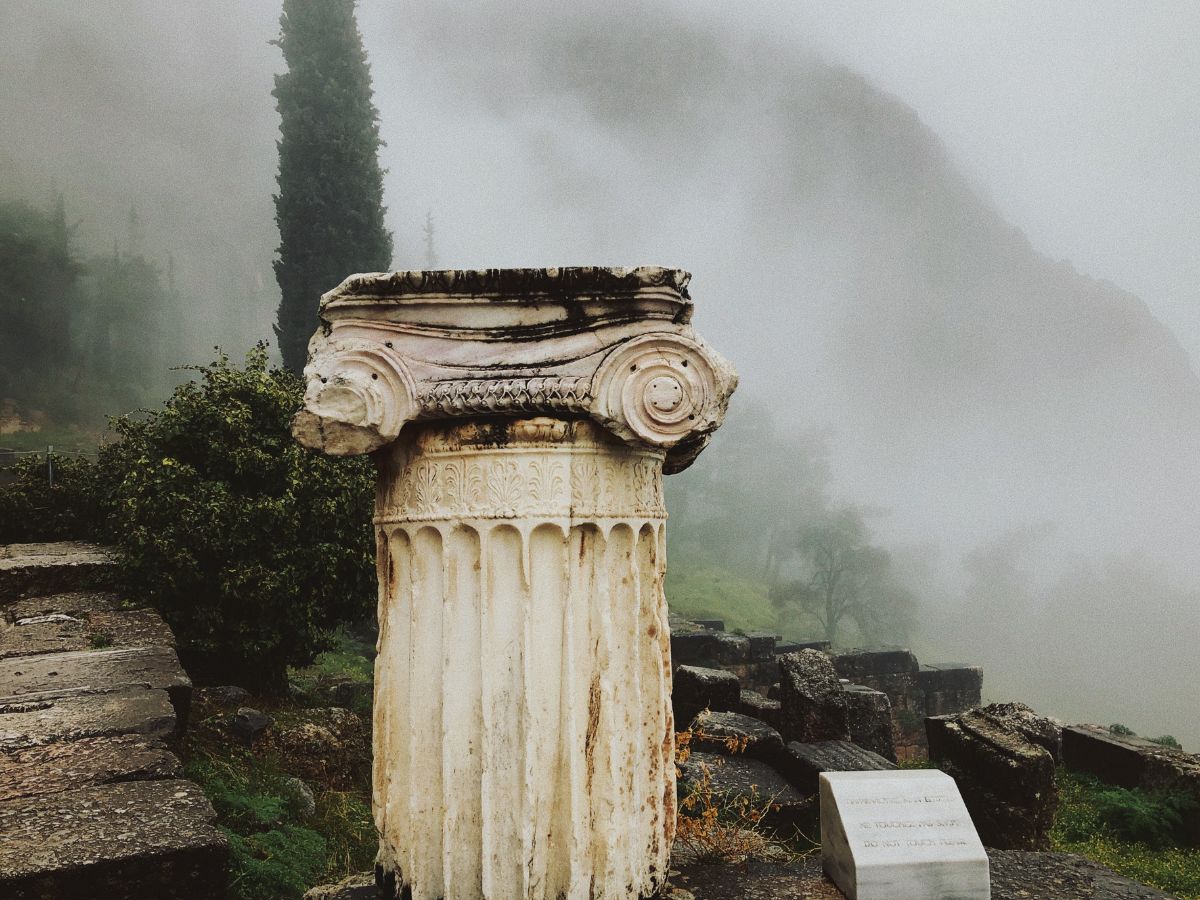
This is a great example of how Ancient Greek quotations could be interpreted in many different ways. The wisdom comes not just from the words themselves, but also how deeply you think about them!
The 147 Delphic Maxims of Apollo
Apart from the three inscriptions on the Temple of Apollo, there were also a large collection consisting of 147 Maxims carved elsewhere in the site. Joannes Stobaeus made a record of them in the 5th century AD.
As these aphorisms are very succinct, they are often cryptic. Just like the Delphic Oracle’s enigmatic prophecies, they may have double meanings, which can be seen in the context of both ancient and modern life.
To make it even more complex, there are a few slightly different versions of this collection, depending on the source you are reading from 🙂
A list of the Delphic Maxims
Here is a complete list of the 147 most commonly accepted Delphic Maxims, as noted by Joannes Stobaeus. It includes the original version in Ancient Greek, so you can see how concise they were.
If you are familiar with Ancient Greek, you can easily see why some of them are so difficult to interpret. And if you can’t read Greek at all, here’s an article on the Greek alphabet!
147 Delphic Maxims
1. Follow God – Ἕπου θεῷ
2. Obey the law – Νόμῳ πείθου
3. Worship the Gods – Θεούς σέβου
4. Respect your parents – Γονεῖς αἰδοῦ
5. Be overcome by justice – Ἡττῶ ὑπό δικαίου
6. Know by learning – Γνῶθι μαθών
7. Listen and understand – Ἀκούσας νόει
8. Be yourself – Σεαυτόν ἴσθι
9. Make plans to get married – Γαμεῖν μέλλε
10. Know the right time for an opportunity – Καιρόν γνῶθι
11. Think as a mortal – Φρόνει θνητά
12. If you are a guest/ stranger, act like one – Ξένος ὢν ἴσθι
13. Honour your hearth – Ἑστίαν τίμα
14. Control yourself – Ἄρχε σεαυτοῦ
15. Help your friends – Φίλοις βοήθει
16. Manage your anger – Θυμοῦ κράτει
17. Exercise prudence – Φρόνησιν ἄσκει
18. Honor providence – Πρόνοιαν τίμα
19. Do not use oaths – Ορκω μη χρω
20. Embrace friendship – Φιλίαν ἀγάπα
21. Persevere with your education – Παιδείας ἀντέχου
22. Pursue honor – Δόξαν δίωκε
23. Seek wisdom – Σοφίαν ζήλου
24. Praise the good – Καλόν εὖ λέγε
25. Find fault with no one – Ψέγε μηδένα
26. Praise virtue – Ἐπαίνει ἀρετήν
27. Do the right thing – Πρᾶττε δίκαια
28. Be kind to your friends – Φίλοις εὐνόει
29. Defend yourself against your enemies – Ἐχθρούς ἀμύνου
30. Exercise nobility of character – Εὐγένειαν ἄσκει
31. Shun evil – Κακίας ἀπέχου
32. Have an interest in public affairs – Κοινός γίνου
33. Protect what is yours – Ἴδια φύλαττε
34. Keep away from what belongs to others – Ἀλλοτρίων ἀπέχου
35. Always listen – Ἄκουε πάντα
36. Have a good reputation – Εὔφημος ἴσθι
37. Do favors for your friends – Φίλῳ χαρίζου
38. Nothing in excess – Μηδέν ἄγαν
39. Do not waste your time – Χρόνου φείδου
40. Anticipate the future – Ὅρα τό μέλλον
41. Despise insolence – Ὕβριν μίσει
42. Respect suppliants – Ἱκέτας αἰδοῦ
43. Be accommodating with everyone – Πᾶσιν ἁρμόζου
44. Educate your sons / children – Υἱούς παίδευε
45. If you have, give – Ἔχων χαρίζου
46. Fear deceit – Δόλον φοβοῦ
47. Speak well of everyone – Εὐλόγει πάντας
48. Become a seeker of wisdom – Φιλόσοφος γίνου
49. Choose wisely / Judge according to the Gods’ will – Ὅσια κρῖνε
50. Think, then act – Γνούς πρᾶττε
51. Stay away from murder – Φόνου ἀπέχου
52. Pray for things that are possible – Εὔχου δυνατά
53. Associate with wise men – Σοφοῖς χρῶ
54. Test people’s character – Ἦθος δοκίμαζε
55. When you receive, give back – Λαβών ἀπόδος
56. Do not suspect anyone – Ὑφορῶ μηδένα
57. Use your skills – Τέχνῃ χρῶ
58. Give what you can – Ὃ μέλλεις, δός
59. Honor good deeds – Εὐεργεσίας τίμα
60. Be jealous of no one – Φθόνει μηδενί
61. Be on your guard – Φυλακῇ πρόσεχε
62. Praise hope – Ἐλπίδα αἴνει
63. Despise slander – Διαβολήν μίσει
64. Gain (possessions) justly – Δικαίως κτῶ
65. Honor the good men – Ἀγαθούς τίμα
66. Know your judge – Κριτήν γνῶθι
67. Keep (respect) your marriage – Γάμους κράτει
68. Believe in fortune – Τύχην νόμιζε
69. Avoid pledges – Ἐγγύην φεῦγε
70. Speak to everyone – Πᾶσι διαλέγου (Alternative version: Speak plainly – Απλῶς διαλέγου)
71. Associate with people similar to you – Ὁμοίοις χρῶ
72. Control your expenses – Δαπανῶν ἄρχου
73. Be content with what you have – Κτώμενος ἥδου
74. Revere a sense of shame – Αἰσχύνην σέβου
75. Do a favour – Χάριν ἐκτέλει
76. Wish for happiness – Εὐτυχίαν εὔχου
77. Embrace your fate – Τύχην στέργε
78. Hear, and observe – Ἀκούων ὅρα
79. Work for what you can acquire – Ἐργάζου κτητά
80. Despise strife – Ἔριν μίσει
81. Detest disgrace – Ὄνειδος ἔχθαιρε
82. Restrain your tongue – Γλῶτταν ἴσχε
83. Defend yourself from insolence – Ὕβριν ἀμύνου
84. Make just judgments – Κρῖνε δίκαια
85. Use what you have – Χρῶ χρήμασιν
86. Judge without accepting gifts – Ἀδωροδόκητος δίκαζε
87. Only accuse someone when they are present – Αἰτιῶ παρόντα
88. Speak only when you know – Λέγε εἰδώς
89. Do not act with violence – Βίας μή ἔχου
90. Live without sorrow – Ἀλύπως βίου
91. Speak gently – Ὁμίλει πρᾴως
92. Complete your affairs without fear / without losing your courage – Περας επιτελει μη αποδειλιων
93. Be kind to everyone – Φιλοφρόνει πᾶσιν
94. Do not curse your sons / children – Υἱοῖς μή καταρῶ
95. Rule your wife – Γυναικός ἄρχε (Alternative version: Rule your tongue – Γλώττης ἄρχε)
96. Be kind to yourself – Σεαυτόν εὖ ποίει
97. Be affable – Εὐπροσήγορος γίνου
98. Give a timely response – Ἀποκρίνου ἐν καιρῷ
99. Make your best effort, while keeping your good reputation – Πόνει μετ’ εὐκλείας
100. Act in a way that you won’t have regrets – Πρᾶττε ἀμετανοήτως
101. If you make a mistake, repent – Ἁμαρτάνων μετανόει
102. Control your eye – Ὀφθαλμοῦ κράτει
103. Take your time to think – Βουλεύου χρόνῳ
104. Act quickly – Πρᾶττε συντόμως
105. Guard your friendships – Φιλίαν φύλαττε
106. Be grateful – Εὐγνώμων γίνου
107. Pursue harmony – Ὁμόνοιαν δίωκε
108. Do not reveal secrets – Ἄρρητον κρύπτε
109. Fear those in power – Τό κρατοῦν φοβοῦ
110. Pursue what is profitable – Τό συμφέρον θηρῶ
111. Wait for the right moment – Καιρόν προσδέχου
112. Destroy hatred – Ἔχθρας διάλυε
113. Accept old age – Γῆρας προσδέχου
114. Do not boast about your strengths – Επι ρωμη μη καυχω
115. Be respectful – Εὐφημίαν ἄσκει
116. Avoid abhorrence – Ἀπέχθειαν φεῦγε
117. Acquire wealth justly – Πλούτει δικαίως
118. Do not abandon honor – Δόξαν μή λεῖπε
119. Despise evil – Κακίαν μίσει
120. Take calculated risks – Κινδύνευε φρονίμως
121. Do not tire of learning – Μανθάνων μή κάμνε
122. Do not leave things undone due to thrift – Φειδομενος μη λειπε
123. Respect the oracles / Admire oracles – Χρησμούς θαύμαζε
124. Love those that you feed – Οὓς τρέφεις, ἀγάπα
125. Do not oppose a person who is absent – Ἀπόντι μή μάχου
126. Respect your elders – Πρεσβύτερον αἰδοῦ
127. Teach the young – Νεώτερον δίδασκε
128. Do not trust wealth – Πλούτῳ ἀπίστει
129. Respect yourself – Σεαυτόν αἰδοῦ
130. Do not be insolent – Μη αρχε υβριζειν
131. Honor your ancestors – Προγόνους στεφάνου
132. Die for your homeland – Θνῆσκε ὑπέρ πατρίδος
133. Do not let life get you down – Τῷ βίῳ μή ἄχθου
134. Do not ridicule the dead – Ἐπί νεκρῷ μή γέλα
135. Sympathize with the unfortunate – Ἀτυχοῦντι συνάχθου
136. Give gifts with prudence – Χαρίζου ἀβλαβῶς
137. Do not let everything upset you – Μη επι παντι λυπου
138. Beget children from noble ancestry / Beget from noble routes / Create from good quality materials – Ἐξ εὐγενῶν γέννα
139. Make promises to no one – Ἐπαγγέλλου μηδενί
140. Do not wrong the dead – Φθιμένους μή ἀδίκει
141. As a mortal, be well off – Εὖ πάσχε ὡς θνητός
142. Do not trust fortune – Τύχῃ μή πίστευε
143. As a child, be well-behaved – Παῖς ὢν κόσμιος ἴσθι
144. When you are a teenager, be self-disciplined – Ἡβῶν ἐγκρατής
145. During your middle-age, be just – Μέσος δίκαιος
146. When you reach old age, be sensible – Πρεσβύτης εὔλογος
147. Upon reaching the end, be without sorrow – Τελευτῶν ἄλυπος
Note that a few more phrases have been suggested, such as Drink in moderation – Πίνων άρμοζε. And who knows if number 95 was referring to woman, or tongue!
How did Ancient Greeks learn about the Delphic Maxims?
In ancient Greece, moral education and guidance began at a young age with the pedagogues and paidotribes, the teachers the trainers of the time.
This procedure continued in the Oracles, which, apart from predictions about the future and the will of the Gods, also offered moral counseling and advice regarding everyday life.
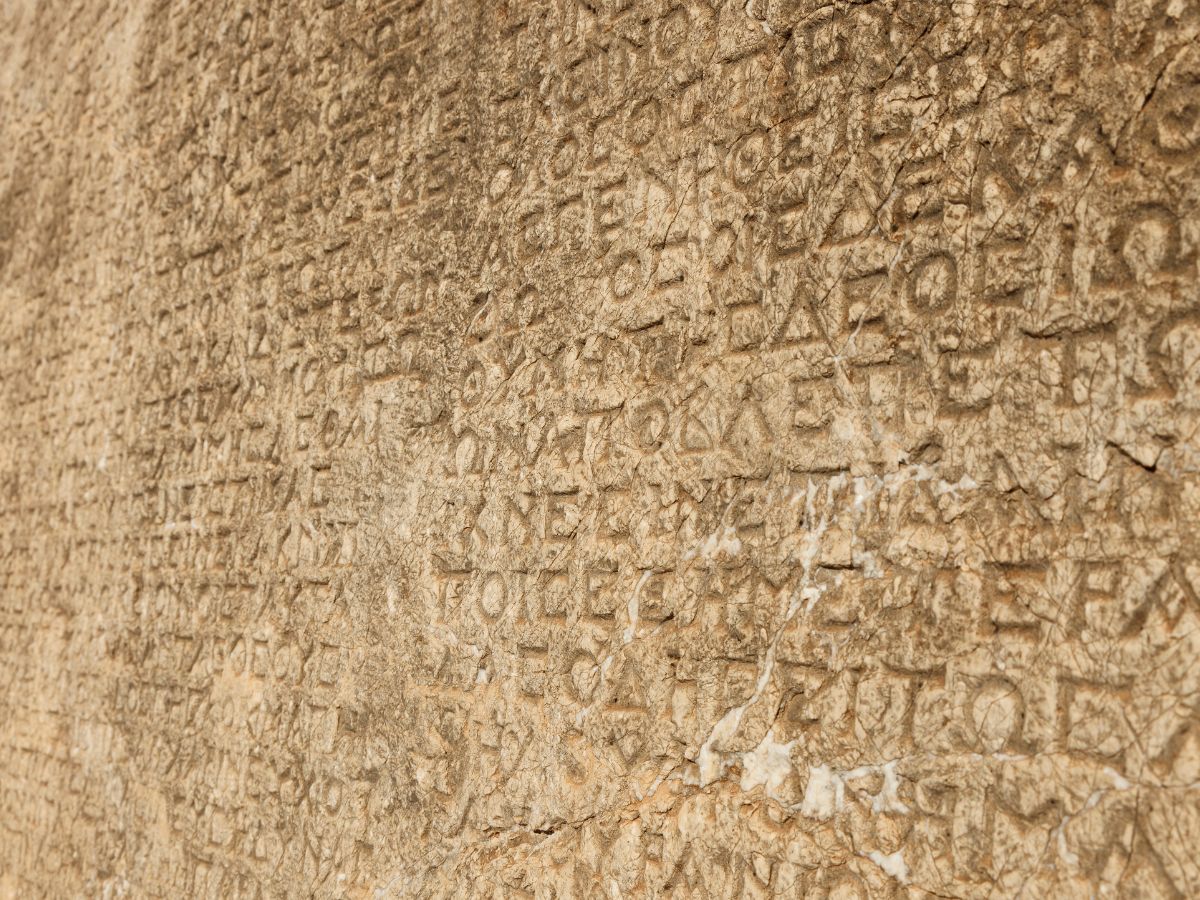
The ancient Greek made pilgrimages to sacred places like Delphi for spiritual and moral guidance. The Delphic Maxims were inscribed in the walls of the temple, and served as a reminder for those seeking direction and ways to improve their moral core.
The Maxims today
So, this was a brief reference to the famous Maxims of Delphi. As you will have noticed, a couple of them may sound dated, and a few seem to contradict each other.
Still, overall, the Maxims are a great reminder of the power of self-discipline and the importance of living by moral principles on a daily basis. They can help you to stay focused and act with wisdom in difficult times.
Perhaps you can choose a few of them to help you with your next Year’s resolutions!
FAQs about the Delphic Maxims
Here is some more information on the Delphic Maxims:
What are the 3 Delphic maxims?
The three best known Delphic maxims are Know Thyself, Nothing In Excess, and A Pledge Brings Trouble.
What are 3 facts about Delphi?
Ancient Greeks considered Ancient Delphi to be the center of the known world. It was a cult place for God Apollo, and home to the famous Oracle of Delphi.
Why is Delphi so important?
Delphi was home to the Oracle of Delphi, and the high priestess, Pythia. People traveled from far and wide to consult her before every major decision regarding all aspects of life.
Where are the Delphic maxims?
The Delphic Maxims used to be inscribed on the walls of the Temple of Apollo at Delphi. They have mostly survived through the work of author Joannes Stobaeus.
Does the Oracle of Delphi still exist?
The Oracle of Delphi was shut down by the Roman Emperor Theodosius in 390-391 AD. However, the archaeological site of Ancient Delphi has been excavated, and it’s one of the top UNESCO sites to visit in Greece.
You can visit Delphi on your own, or on this fab guided tour where you will learn more about Ancient Delphi, Apollo and the Oracle.
More articles about Greece
If you enjoyed this article, have a look at these other ones:
- Quotes about Greece
- Useful words in Greek
- 12 Ancient Greek philosophers who changed the world
- Best Greek mythology movies
- The Greek Gods of Mt Olympus
- How to swear like a Greek
- The evil eye in Greece
 Hi! I’m Vanessa from Athens. Almost 2,500 years after they were written, many of the Delphic Maxims remain relevant. Let me know if any of them have inspired you for your New Year’s Resolutions!
Hi! I’m Vanessa from Athens. Almost 2,500 years after they were written, many of the Delphic Maxims remain relevant. Let me know if any of them have inspired you for your New Year’s Resolutions!
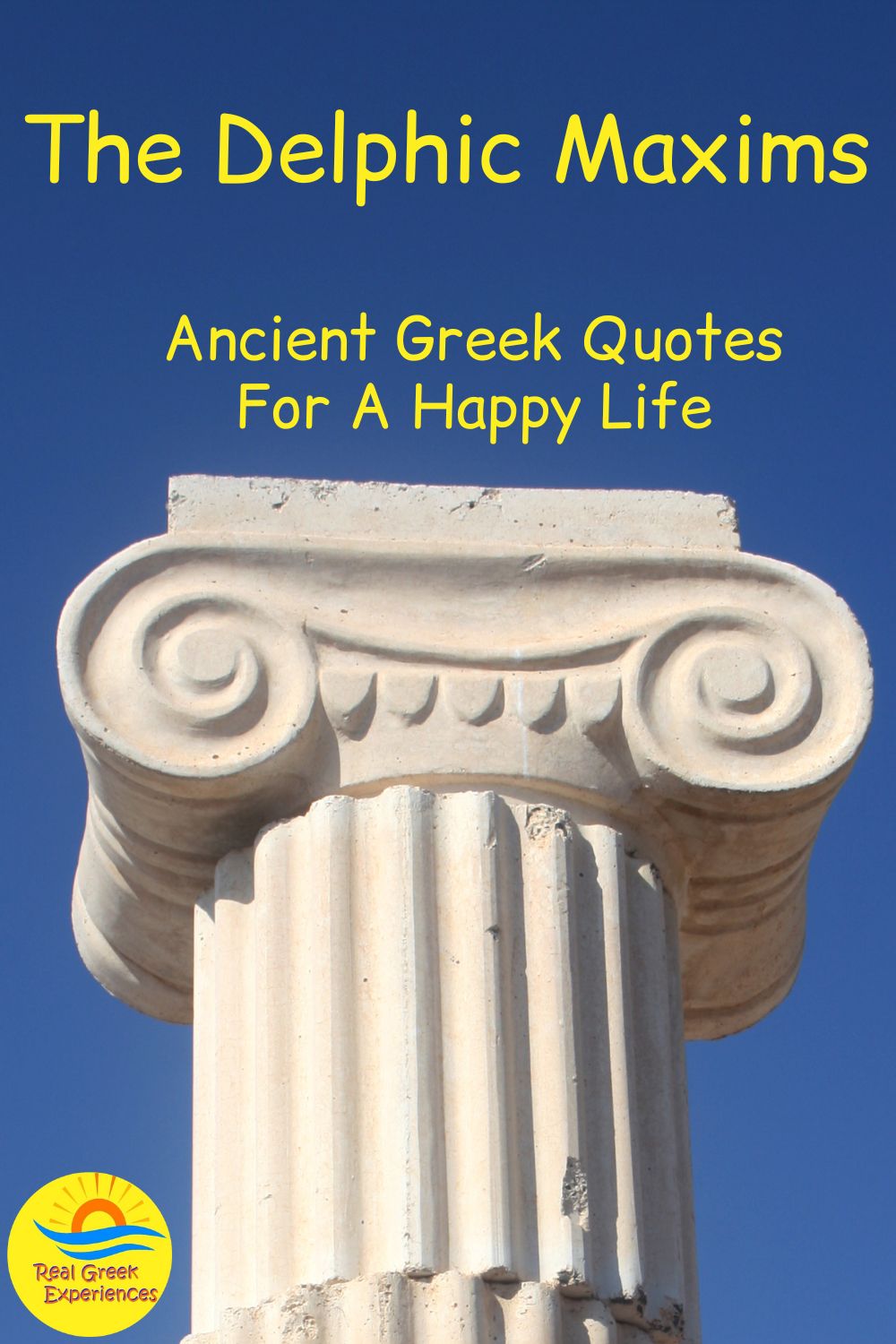

Hi, Vanessa!…
The following quote attributed to Philostratus, in Life of Apollonius of Tyana 5. 4 (trans. Conybeare… Greek biography Circa 1st century A.D. to Circa 2nd century A.D.), at http://www.theoi.com/Daimon/Tekhne.html, leads me to conclude, that: a) there was an ancient Greek statue to Τεχνη/ Tekhne; b) there was an ancient Greek symbol associated with Tekhne; c) the statue and symbol of the daimona Τεχνη/ Tekhne is of a female; and d), there are ancient Greek and/ or other historic records linking this female daimona Τεχνη/ Tekhne to Hephaistos/ (Hephaestus) and to the Mousai/ (Muses)… and, we may be on the verge of locating the actual Τεχνη/ Tekhne object and alter referenced in his quote, in light of the discovery cited at, allthatsinteresting.com/archaeology-news-2022/11– the very location mentioned by Philostratus!
All the best, and may God Bless!…